Have you ever wondered what physical activity would suit you best? I have, several times. I tried many different sports throughout my life, but I have never been consistent with any of them.
It was a never-ending quest to find the golden sport, until now... I finally found it! Let's talk about surfing!
It might sound trivial from an Australian point-of-view, as most of the population lives not far from the coast, but it's not an activity I had the chance to practice back in France. I always lived far from the coast, and jumped on a surfboard for the first time in Sydney three months ago. It was a revelation.
I always wanted to be a surfer. I've been skateboarding for many years when I was a teenager, and always wondered how it would feel to ride waves instead of concrete (hint: it's very different, and a surfboarding background doesn't help as much as I thought).
I really enjoyed skateboarding, but after breaking my arm, twisting my wrist, and harming my hip - it was time to move on.
Surfing now feels like getting back to skateboarding, with the bonus of spending time in the Ocean. I now surf at least 4 times a week, and I feel unimaginably good after each session. It also keeps me fit, which can be challenging with the amazing food scene of Sydney 😄
Most importantly, surfing helps me find a good work-life balance. Without exercising, I tend to work too much and not give enough time for myself, which, in turn, decreases my productivity at work.
No matter how much you love your work, it shouldn't come at the expense of your mental health. Give yourself time to shut off sometimes, and do something you love! Spending time with your family and friends and giving time for your hobbies will make you happier, and this could only boost your productivity!
Personally, after one-hour surfing in the morning, I'm ready to kick in at work!
If you're interested about knowing how it feels to ride along waves, I compiled 15 tips to begin your surfing journey:
| 1. Find the right surfboard Picking up the right surfboard for you is key. As a beginner, you want to choose a surfboard with a maximum of volume to help you to catch as many waves as possible. I recommend choosing a foam surfboard ("foamie") - they are very buoyant and that's what you want to begin with! Surfing is hard, starting with a performance shortboard will only slow down your progress! When you'll feel the foamie is slowing down your progress, upgrade to a more traditional surfboard. Mini mals, fish, or high-volume shortboards are good picks to transition to intermediate surfing. |
| 2. Find the right wetsuit The importance of having a good wetsuit is usually underestimated but it's crucial to get a good one. Feeling cold could ruin your whole surfing experience. When choosing your wetsuit, make sure it's very tight - if you sweat to get in, you're on the right track! I personally got a 3/2mm ultra-premium from NeedEssentials - they are great for the water temperature of Sydney in winter (but you might want to get a different one if you're in colder/warmer waters). |
| 3. Be ready to wake up early Technically, you don't have to wake up early. However, surfing conditions are usually better in the morning because the wind doesn't blow much, and beaches are often less crowded. I personally enjoy going early in the morning to enjoy a prime view on Sydney's sunrises, they are invaluable! |
| 4. Don't learn all by yourself Aside from fun, surfing is all about technique. Without proper advice, you might end up with inappropriate habits that will be hard to get rid of. Surf classes are offered on most surf beaches, usually for an affordable price. If you don't want to spend money, you could also ask advice from more experienced surfers. Most will be happy to give you advice and could even become your surf buddies - don't be afraid to ask! YouTube is also full of informative videos, so learning from the comfort of your couch is an option. 5. Learn the surfer's code Surfers have rules, and you must follow them to be safe, and keep others safe. They are pretty simple, but you might do mistakes at the beginning. Don't worry, everybody does, and you will naturally embrace the code with time. |
It is usually a good option to start your surfing experience on the white water. You can learn how to pop up and you will have a ton of fun!
When you feel bored with the white water, transition to small waves - but do not go on the peak with 4+ feet waves!
It could be dangerous because you will be surrounded by more experience surfers. You will make a lot of mistakes and you want to avoid being hurt, and hurt someone else. Stay on small waves as long as needed.
If you can, get away from the crowded beaches of the Eastern suburbs. Catching waves will be more challenging and you have a higher chance of getting injured (especially if others don't follow the code). Therefore, less crowded beaches will allow you to progress faster in a safe environment.
If you can't get out of the city (e.g. in the morning before work), try not to go where everybody already is – you can find good spots few meters away.
| 8. Find buddies I've been lucky, my roommate is a good surfer. He gave me many tips, and we're now surfing buddies. To be honest, without him, I probably wouldn't find the motivation to wake up early in the morning. Both our partners also joined us in this surfing journey and we're having so much fun! If you have friends to go surfing with, do it - it's always funnier than on your own. I you don't, chat with people in the water, many would love to find buddies as well! 9. Paddle, paddle, and paddle again When you think you paddled enough, take 2 more strokes. People (including myself) usually don't paddle enough, and 2 strokes can make a real difference on your position on the wave. Paddling technique is also important, arch your back onto a "banana-shape", watch others, and get advice - this could drastically improve your paddling! |
Surfing is not all about riding waves, but also getting ridden by waves - the Ocean loves to remind us that!
It's really important to know how to fall and keep calm under the water. Don't panic, the small waves won't hurt you if you keep calm.
That may sound slightly weird but, eventually, you will learn to have fun of your wipeouts. It's part of the process!
When you can, fall flat as a crêpe, as far from your surfboard as possible, and you won't get injured 😉
Surfing comes with its dangers and you have to be mindful of the risks. However, if you play it safe (e.g. know how to fall, follow the rules), you will unlikely be injured.
Don't be intimidated by the waves, they are mostly friendly, especially when you begin with small waves.
Surfing is hard, progress is slow, and it can be very frustrated. Even though you might spend hours not catching a single wave, do not give up! With time, you will learn how to read the waves, and your technique will improve - you will get more and more waves. The key is to spend as much time in the water as possible.
Sooner than you think, you'll be at the peak, and you'll realize how much you've progressed (and it feels good!)
It's a very demanding sport, and your muscles will let you know that. You will feel as sore as after a huge workout! Although you might be excited to get back in the water, it's also important to give time for your body to recover.
It is also a good reason to turn your early alarm off, and sleep in 😉
After few weeks, you will realize your mindset changed.
You will never see the water in the same way. While looking at a landscape, your attention may be driven by the waves, you may imagine yourself on them. You may think about your next session at inappropriate moments or dream about surfing - it may become an addiction. However, that's an healthy one so you shouldn't worry too much.
| 15. Have fun! Last but not least, have fun! That's the most important part. It might not be the golden sport for you and if you're not having fun, it's not worth it. I love this quote by Phil Edwards: "The best surfer out there is the one having the most fun!" |

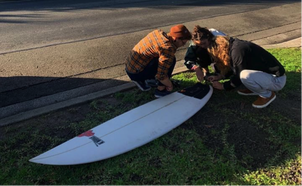


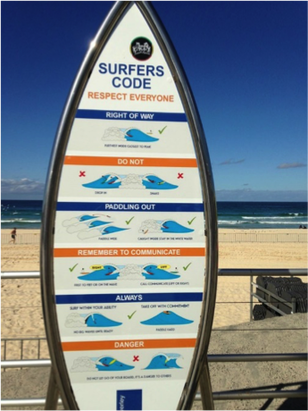
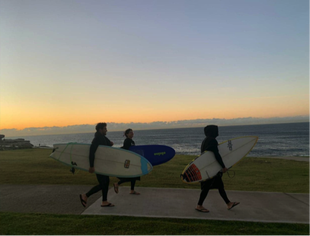
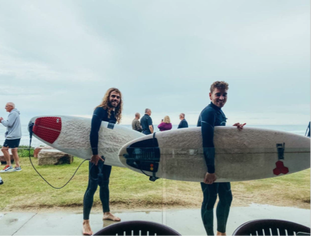
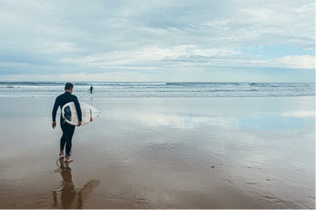
 RSS Feed
RSS Feed